Front Cover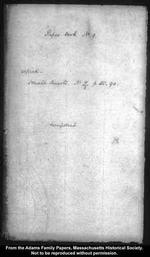
Paper book No. 9 copied. ["Paper book No. 9 copied." added by Charles Francis Adams][No transcription available -- see page image]
Inside Front Cover
Page i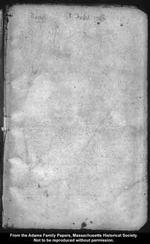
[No transcription available -- see page image]
Page ii
Page 1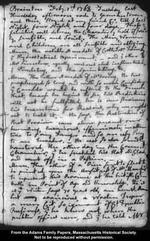
BRAINTREE FEBY. 1st. 1763. TUESDAY.
Last Thurdsday afternoon, rode to Germantown, and there stayed at my friend Cs. till the last Night. Four Nights, and four days. Those 2 families well deserve the Character they hold of friendly, sensible, and Social. The Men, Women and Children, are all sensible and obliging.
Mem. The notable Anecdote of Coll. Josa. Quincy. The Hydrostatical Experiment. And the other of Mrs. Lincoln, equally curious and instructive. The Pinching, and the Sprinkling, &c.
Mem. The other Anecdote of Mr. Erving. He has prophesyed so long, and with so much Confidence that Canada would be restored to the French that, because he begins to see his Predictions will not be fullfilled, he is now straining his Invention for Reasons, why we ought not to hold it. He says, the Restoration of that Province can alone prevent our becoming luxurious, effeminate, inattentive to any Danger and so an easy Prey to an Invader. He was so soundly bantered, the other day in the Council Chamber, that he snatched his Hat and Cloak and went off, in a Passion.
Mem. The other of a Piece sent to Fleet to be printed, upon the Unfitness of
Mr. Mauduit to represent this Province, at the british Court, both in Point of Age and Knowledge. He is as that Writer says 70 Years old, an honest Man but
[illegible] avaricious, a Woolen Draper, a mere Cit, so ignorant of Court and public Business, that he knew not where the public offices were, and that he told
Mr.
Page 2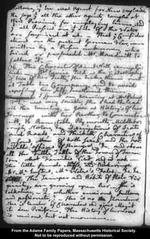
Bollan, that he was Agent for New England. He says that all the other Agents laugh at this Province, for employing him. And that all Persons on that Side of the Water are
surprized at us. That the Considerations on the present German War, were written by a Person unknown, who hired or persuaded Mr. Mauduitt to father it.
Ob. [Observation] The Character of Aunt Nell, exemplified. Mrs. Eunice told us the Catastrophe of two of her Teeth, she broke them out at Table in Company, and to avoid exposing her self, swallowed them.
I spent an Evening at Mrs. Palmers. Mrs. E. [Eunice] was very sociable, she had the lead all the Evening. Gave us History's of her journeys with her Brother, to Connecticutt, to Barnstable, Plymouth, Middleborough, Norton, &c. Descriptions of Seats and Roads, and Thicketts, Characters of Persons, Men of both sexes, and the hospitable offices of strangers, &c., and above all the Tittle, Tattle of the Town of Taunton, what Families Visit, and what not. The little female Miffs, and Bickerings. Dr. McInsters [McKinstrys], McWaters's, Fales, &c. &c.
The Temper and Habits of stale Virginity, are growing upon her. She is talkative. Q. [Query] whether envious, sullen and passionate? She is no slanderer. She is tender of Characters and gives Merit its due Praise. The History of her Loves is curious, but not uncommon.
Page 3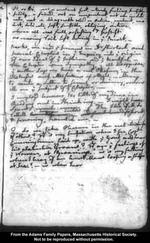
[H.?] or Di. was a constant feast. Tender feeling, sensible, friendly. A friend. Not an imprudent, not an indelicate, not a disagreeable Word or Action. Prudent, modest, delicate, soft, sensible, obliging, active.
Where all was full, possessing and possest
no craving Void left Aching in the Breast.
Books, we read 5 Sermons in Dr. Shirlock [Sherlock], and several Chapters in the Inquiry into the origin of our Ideas of the Sublime and the beautiful. The Chapter upon Sympathy, they all disapprove. The Author says we have a real Pleasure, in the Distresses and Misfortunes of others. Mem. To write a Letter to Sewal or Quincy, or Lowell on the subject of that Chapter.
I employed however, too little of my Time in Reading and in Thinking. I might have spent much more. The Idea of M. de Vattell indeed, [illegible] scowling and frowning, haunted me.
Q. Do we take Pleasure in the real Distresses of others? What is my Sensation, when I see Captn. Cunningham, laid up, with the Gout, and hear his plaintive Groans? What are the feelings of the Women, at Groanings? What is my feeling when I hear of an honest Mans loosing a ship at Sea? What when I hear [sentence unfinished]
Page 4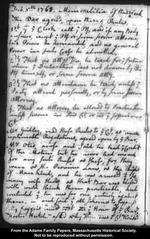
FEB- 5TH. 1763
Memorabilia of this Week.
The Bar agreed upon these 4 Rules.
1st. That the Clerk call the Plaintiff, and if any Body answer, except the Plaintiff or some sworn Attorney, his Power be demanded, and no general Power in such Case be admitted.
2dly. That no Attorneys Fee be taxed for the future where the Declaration was not drawn by the Plaintiff himself, or some sworn Attorney.
3dly. That no attendance be taxed, unless the Party attend personally, or by some sworn Attorney.
4. That no Attorney be allowed to Practice here unless sworn in this Court or in the superiour Court.
Mr. Gridley read these Rules to the Court as unexceptionable Regulations, agreed upon by the Bar. Mr. Otis arose and said he had the Credit of the Motion, but he never had moved for any such Rules as these, for they were
vs. the Province Law,
vs. the Rights of Mankind, and he was amazed that so many wise Heads as that Bar was blessed with could think them practicable, and concluded that he was for one, entirely against them. And said that all schemes to suppress Petty fogger's must rest on the Honor of the Bar. Foster Hutchinson asked why then was the Court troubled
Page 5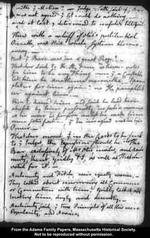
with the Motion? Judge Watts said if the Bar was not agreed the Court could do nothing. And at last they determined to consider till April.
Thus with a whiff of Otis's pestilential Breath, was this whole system blown away.
But the Barr was in a great Ragel
Thatcher said to K. [Kent] A. [Auchmuty] and me, "whoever votes for him to be any Thing more than a Constable let him be Anathema maranatha. I pamphleteer for him again? No. Ile pamphleteer against him.
K.-t. [Kent] damned him and said he had been abused by him personally, in such a manner as he never would forgive, unless he made him more satisfaction, than he imagined was in his Power.
Thatcher moved, that in the Cards to be sent to the judges, the Expression should be "The Bar, exclusively of Mr. Otis, invites," and Auchmuty, Kent, Gridley and I, as well as Thatcher voted for it.
Auchmuty and Fitch were equally warm. They talked about renouncing all Commerce or Connection with him. Gridley talked about treating him dryly and decently.
Auchmuty said, the two Principles of all this were Popularity, and Avarice.
Page 6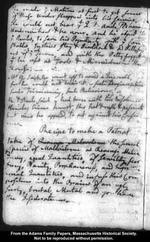
He made the Motion at first to get some of these Under strappers into his service. He could not bear that Q [Quincy] and Auch. should have Underworkers and he none. And he objected to the Rules, to save his Popularity, with the Constables, Justices Story and Ruddock &c. and Pettyfoggers of the Town, and with the Pettyfoggers that he uses as Tools and Mirmidons in the House.
Mr. G. said he went off to avoid a Quarell, for he could not bear it. Such Tergiversation, such Trimming, such Behaviour.
K. and Auch. said they had born with his Insolence thinking him honest, tho hot and rash and passionate, but now he appeared to act against his Conscience.
Recipe to make a Patriot
Take of Revenge, Malevolence the several Species of Malevolence, as Revenge, Malice, Envy, equal Quantities, of servility, fear, fury, Vanity, Prophaneness, and Ingratitude, equal Quantities, and infuse this Composition into the Brains of an ugly, surly, brutal Mortal and you have the Desideratum.
Page 7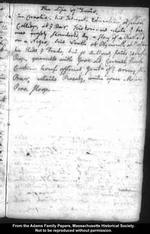
The Life of Furio.
In Croatia. His Descent. Education, at school, Colledge, at the Bar. Historians relate that he was grossly slandered, by a story of a Bastard on a Negro, his Wrath at Plymouth, at Boston he Heads the Trade, brings Actions, fails, is chosen Representative, quarrells with Governor, Lieutenant [Governor], Council, House, Custom house officers, Gentlemen of the Army, the Bar, retails prosody, writes upon Money, Prov. [Province] sloop.
Page 8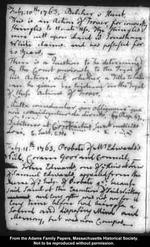
FEBY. 10TH. 1763.
Belcher v. Hunt. This is an Action of Trover, for converting shingles to Hunts Use. The shingles were cutt upon Land which Jonathan White claims and has possessed for 20 Years.
There is a Question to be determined by the Court previously to the Tryal of his Action, vizt. whether a Title to Land can be given in Evidence, in the Tryal of these Actions of Trover.
Multa conceduntur per Obliquum quae non conceduntur de directo. 6. Rep. 47. Debitum et Contractus sunt nullius Loci. 2. Inst. 231.
FEBY. 11TH. 1763.
Probate of Mr. Edwards's Will, Coram Governor and Council. John Edwards, one of the Heirs at Law of Samuel Edwards, appealed from the Decree of the Judge of Probate, 1st. because said Saml. at the Execution of said Writing [illegible] and long after was not, nor for a long time before had been of a sound and disposing Mind and Memory, but was non Compos.
Page 9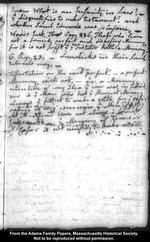
Quaere. What is an Insanity, in Law? that disqualifies to make testament? and whether Saml. Edwards was so insane. Woods Inst. Page 336. Those who have not a sound, perfect and disposing Memory, for it is not sufficient that the Testator hath a Memory. 6. Rep. 23. Lunaticks in their Lucid Intervals may.
Dissertation on the word "perfect." A perfect Memory exists not -- i.e. a Memory retentive of every Idea that ever was in the Mind. Nor is the Man who has the strongest Memory always the fittest to make a Will. For the observation is very common that Men of the strongest Memories have not always the soundest judgments. The Memory of Xerxes or of C sar is not necessary to make a Will.
Page 10
Page 11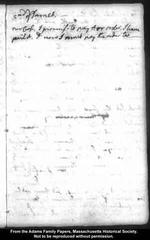
2nd. of James.
Our Case. I promise to pay A or order. I have paid A. and now I must pay the order too.
[DRAFT OF AN ESSAY ON AGRICULTURE, eventually published in theBoston Gazette, 18 JULY 1763.]LATE JUNE 1763 [Before 18 July 1763.]
[The rough draft (appearing on pages 12 - 24) eventually was published in the Boston Gazette, 18 July 1763. The transcription below matches the draft as it appears on the manuscript pages with the conclusiion appearing on pages 12 and 24 and the first sentence of the published version ("Among the Votaries of Science,...) appearing on page 13. ]
Page 12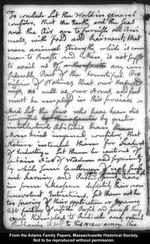
To conclude Let the World in general consider, that the Earth, and the seas and the Air, are to furnish all Animals, with food and Raiment; that mere animal strength, which is common to Beasts and Men, is not sufficient to avail us of [illegible] any considerable Part of the bountiful Provision of Nature; that our Understandings, as well as our Arms and feet, must be employed in this service. And Let the few who have been distinguished by their ? by greater intellectual Abilities than [illegible] Mankind in general, consider, that Nature intended them for Leaders of Industry. Let them be cautious of certain Airs of Wisdom and superiority by which some Gentlemen of real sense and Learning, and Public spirit, giving offence to the common People, have in some Measure defeated their own benevolent Intentions. Let them not be too sparing of their Application or Expence, lest failing of visible Profit and success they expose themselves to Ridicule and rational Husbandry itself to Disgrace among the
Page 13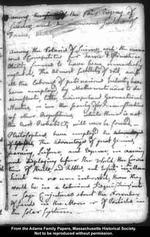
among
[illegible] the fair Progeny of Science, and the numerous
[functions?] of Fame, Utility [sentence unfinished]
Among the Votaries of Science, and the numerous Competitors for Fame and Estimation, Utility seems to have been remarkably neglected. The Utmost subtlety of Wit, and all the labours of pertinacious Industry have been employed by Mathematicians to demonstrate little, unimportant Geometrical Niceties, or in searching for Demonstrations of other Propositions, which there is not the least Probability will ever be found. Philosophers have employed the Advantages of G? Advantages of great Genius, Learning, Leisure, and Expense, in examining and displaying before the World, the formation of Shells, and Pebbles, and Insects, in which Mankind are no more interested, than they would be in a laborious Disquisition into or sage Conjectures about the Number of sands in the Moon or of Particles in the solar system.
Page 14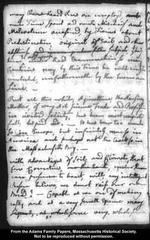
Many
Pens learned Pens are employed, much Time spent and much Mischeif and Malevolence occasioned, by Divines about Predestination,
[the] Original of Evil, and other abstruse
[illegible] subjects, that having been
to no good Purpose under learned Examination so many Centuries may by this Time be well enough concluded unfathomable by the human Line.
But all this while, Agriculture, the Nursing Mother of every Art, Science, Trade and Profession in civilized society, has been most ungratefully despized. It has been too much so in Europe, but infinitely more so in America, and perhaps not the least so in the Massachusetts Bay.
With Advantages of Soil, and Climate, that few Countries as the Earth under Heaven can presume to boast, will any intelligent Person believe, we do not raise our own Bread? Capable as we are of making easily and at a very small Expence many Liquors as wholesome very wholesome,
Page 15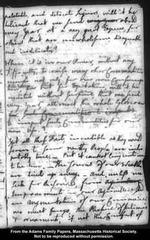
palatable, and delicate Liquors, will it be believed that we send
every Year abroad every Year, at a very great
Expence, for others that are unwholesome,
disagreable and indelicate?
When it is in our Power, without any Difficulty, to raise many other Commodities, enough not only for our own Consumption, but for Exportation, will it be credited without surprize, that we send every Year, allmost the whole Globe over, for such Commodities to import to import such Commodities for our own Use?
Yet all these Facts, incredible as they would seem to some worthy People, are indisputably true. But it cannot long continue to be true. The sources of our Wealth are dried away. And unless we seek for Resources, from Agriculture Improvements in our Agriculture and an Augmentation of our Commerce, we must forego the Pleasure of Delicacies and ornaments, if not the Comfort of
Page 16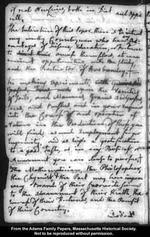
of real Necessaries, both in Diet and Apparell.
The Intention of this Paper then is to intreat my worthy Countrymen who have any Advantages of Leisure, Education, or Fortune to [illegible] amuse themselves, at convenient opportunities, with the study, and the Practice too, of Husbandry. Nor let the narrow Circumstances of others who have Power to think and Act, discourage them from exerting their talents in the same Way, for
haud facile emergunt, Quorum Virtutibus, obstat
Res angusta Domi
with all its Truth and Pathos, has done more Mischief in the World by soothing the Pride and Indolence of Genius, than it ever did good, by prompting the rich and Powerfull to seek the solitary Haunts of Merit to amplify its sphere.
In making Experiments, [illegible] upon the Varieties of soils, and Manures, Grains and Grasses, Trees, and Bushes, and in your Enquiries into the Course and operation of Nature in the Production of these, you will find as much Employment for your Ingenuity, and as high a Gratification to a good Taste, as in any Business or Amusement you can chuse to pursue. The finest Productions of the Poet or the Painter, the statuary or the Architect, when they stand in Competition with the great and beautiful operations of Nature, in the Animal and Vegetable World, must be pronounced mean and despicable Baubles. The Mathematician, the Philosopher, the Chymist, and the Poet may here improve every Branch of their favorite sciences to the Advancement of their Health, the Increase of their Fortunes, and the Benefit of their Country.
Page 17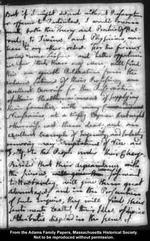
But if I might descend without Presumption or offence to Particulars, I would recommend both the Theory and Practice of Husbandry, to Divines and Physicians, more than to any other orders. For the former having more Leisure and better opportunities for study than any Men, will find this an agreable Relaxation from the arduous Labours of their Profession, an excellent Exercise for the Preservation of their Health, a means of supplying their families, with many [illegible] Necessaries, at a trifling Expence that might otherwise cost them dear; and an excellent Example of Ingenuity, and Industry, removing many Temptations of Vice and Folly to the People under their Charge. Besides that their Acquaintance with the sciences will give the subservient to Husbandry, will give them great Advantages, and in the Prosecution of such Enquiries, they will find their sentiments Exalted, their Ideas of divine Attributes displayed in the scenes of
Page 18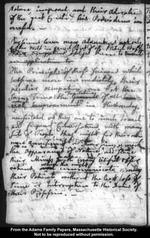
Nature, improved, and their Adoration of the great Creator and his Providence increased.
Physicians have many Advantages not only of the World in general, but of other liberal Professions. [illegible] The Principles of those sciences which subserve more immediately their peculiar occupation are at the same Time the grounds Foundation of all real [and] rational Improvements in Husbandry. Necessitated as they are to much Travel and frequent Conversations, with many sorts of People, they might, for their own Amusement and Diversion, remark the Appearances of Nature, and store their Minds with many useful observations, which they might communicate among their Patients, without the least loss of Time or Interruption to the Duties of their Profession.
Page 19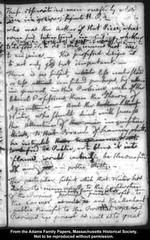
These observations were occasioned by a late Piece in your Paper, signed H.P. -- Who was the Author of that Piece, what were his Intentions, in Writing, whether to do good or to do Evil, and why he chose that manner of conveying his Thoughts to the public, it concerns not me to enquire. His professed design is not only good but important. There is no subject, less understood, or less considered perhaps, by Men in general, in this Province, even of the liberal Professions, than the Theory of Agriculture. And the [illegible] Writer, who should direct with success the Attention of [illegible] inquisitive Minds, to that Branch of Learning, whether he intended [illegible] to befriend the public or to blow it into flames, would certainly be the Occasion of much public Utility.
The particular subject which that Writer has chosen to recommend to the Consideration of the Province, promises, more fairly than any other, private Profit to the farmer as well as and the Merchant, public Benefit to the Province, or perhaps Provinces in general, as well as to Great
Page 20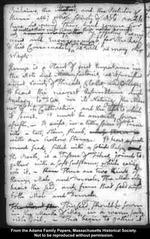
Britain, the
Mother Parent and the Protector of them all; whose society of Arts and &c. have discovered their kind concern for us,
among many other as well as their wise Care for their native Country, by offering Praemiums and Encouragements, for the Raising of this Commodity
in New England as well as many other Ways.
Hemp is a Plant of great Importance in the Arts and Manufactories, as it furnishes a great Variety of Threads, Cloths, and Cordage. It bears the nearest Resemblance and Analogy, to Flax, in its Nature, the Manner of its Cultivation, and the Uses Purposes to which it serves. It must be annually sown afresh. It arises, in a little space of Time, into a tall, slim, shrub, [illegible] with an hollow stem. It bears a small round seed, filled with a solid Pulp. Its Bark is a Tissue of Fibres, joined together with a soft substance, which easily rots it. There There are two Kinds of Hemp, Male and Female. The Male only bears the seed, and from that seed arises both Male and Female.
[illegible] The seed should be sown in the Month of May, in a warm, sandy, rich soil. They begin to gather it
Page 21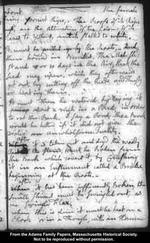
about
[the first of August,] the female being soonest Ripe. The Proofs of its Ripeness, are the alteration of the
Colour of its leaves to Yellow, and its stalks to white. It must be pulled up by the Roots, and then bound in Bundles. The Male should stand 8 or 10 days in the Air, that the seed may ripen, which they afterwards get out, by cutting off the Heads and threshing or beating them. It must then be watered by laying it
[illegible] about a Week in a Pond, in order not to rot the Bark. I say a Pond,
tho a Brook would be better if it did not give the Water an unwholesome Quality.
When After it is taken out and dryed the woody Part of the stem must be broken from the Bark which covers it, by crushing it in an Instrument called a Brake, beginning at the Roots.
When After it has been sufficiently broken, the small shivers must be swingled out, as we swingle Flax. When this is done it must be beat on a Block or in a Trough, with an Hammer
Page 22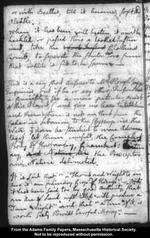
or with Beetles, till it becomes soft and Pliable. When it has been well beaten, it must be heckled, or passed
thro a toothed Instrument, like the
[illegible] Clothiers Comb, to
seperate the shorter Tow, from that which is fit to be spun.
This is a very short Answer to Mr. Plough Joggers Inquiries, but if he or any other Person has a Curiosity to see a more particular Account of this Plant, (and give me leave to tell him and them there is not an Herb from the Cedar in Lebanon, to the Hyssop in the Wall, that can be studied to more Advantage) let them consult the Compleat Body of Husbandry, Chambers's Dictionary, and Nature del the Praeceptor and Nature delineated.
It is said that, "a Thousand Weight to an Acre is an ordinary Crop of Hemp." And it has been said too, by good authority, that "an Acre of Land well tilled will produce a Tun Weight" and that "a Tun of it, is worth sixty Pounds lawful Money."
Page 23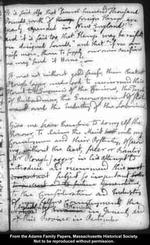
It is said also that "several hundred Thousand Pounds worth of
Hemp foreign Hemp, are yearly expended in New England." And it is said too, that "Hemp may be raised on dreigned Lands," and that "if we can raise more than to supply our own Occasions we may send it Home."
It was not without good sense, then that Mr. Plough jogger undertook to recommend this Plant to the Enquiries of the Curious, the Tryal of Husbandmen, the Encouragement of Statesmen and the Industry of the Laborious.
Give me Leave therefore to do myself the Honour, to claim the Merit [illegible] with my Countrymen and their Posterity, of seconding without the least sneer or Banter, Mr. Ploughjogger, in his Attempt to introduce and recommend this most important subject so important both to present and to future Generations to the Consideration and Industry of my fellow Countrymen, the [illegible] of AmericaInhabitants of New England in General, and of this Province in Particular.
Page 24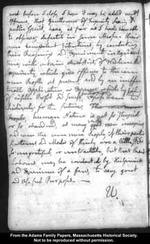
[No transcription available -- see page image]
common People. Human Nature is not so stupid or so abandoned, as many worthy men imagine, and even the common People, if their peculiar Customs and Modes of thinking are a little studied, [are not] so ungrateful, or untractible, but that their Labours may be conducted, by the Genius and Experience of a few, to very great and useful Purposes. U.
Page 25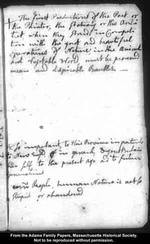
[No transcription available -- see page image]
Page 26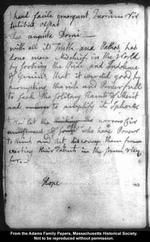
[No transcription available -- see page image]
Page 27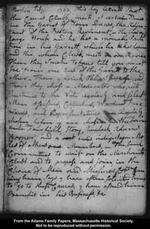
BOSTON FEBY. 1763
This day learned that the Caucas Clubb meets at certain Times in the Garret of Tom Daws, the Adjutant of the Boston Regiment. He has a large House, and he has a moveable Partition in his Garrett, which he takes down and the whole Clubb meets in one Room. There they smoke tobacco till you cannot see from one End of the Garrett to the other. There they drink Phlip I suppose, and there they choose a Moderator, who puts Questions to the Vote regularly, and select Men, Assessors, Collectors, Wardens, Fire Wards, and Representatives are Regularly chosen before they are chosen in the Town. Uncle Fairfield, Story, Ruddock, Adams, Cooper, and a most rudis indigestaque Moles of others are Members. They send Committees to wait on the Merchants Clubb and to propose, and join, in the Choice of Men and Measures. Captn. Cunningham says they have often solicited him to go to these Caucas, they have assured him Benefit in his Business, &c.
Page 28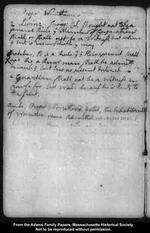
Propr. [Proprietor] of Wrentham v. [Metcalf.]
2 Levinz. Scroaggs [Scroggs] C.J. It ought not to be a general Rule, that Members of Corporations shall or shall not be a Witness. But where the Int. [Interest] is inconsiderable they may.
Thatcher. It is a Rule that the Heir apparent shall not tho a Rem[ainde]r man shall be admitted because the last has no present Interest. A Guardian shall not be a Witness in Cause for his Ward because he is Party to the suit.
Auch. [Auchmuty] Proprs. Worcester v. Gates, the Inhabitants of Worcester were Admitted on Argument.
Page 29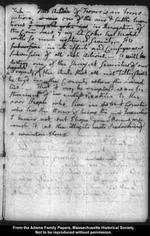
FEB.
This Action of Trover is an Innovation, a new one of the new and subtle Inventions [illegible] in Derogation of the Common Law, that my Lord Coke has treated with so much righteous severity. It is subsersive in its Effects and Consequences subversive of all real Actions. It will destroy one of the strongest securities of our landed Property, the Rule that all real Titles shall be tryed in the County where the Land lies. That it may be employed as an Instrument of endless Vexation to the poor People who live in distant Counties, who has the Honor of being the first Inventor I know not, but I hope your Honors will crush it as the illegitimate Production of a wanton Hour. [The foregoing notes evidently relate to the case of Gardiner v. Purrington, in the Suffolk Superior Court, Feb. term, 1763.]
Page 30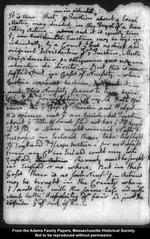
It is true that, an incidental Question about a local Matter, may [be] decided, in the Tryal of a transitory Action-- [illegible] and it is equally true that, an incidental [a] Question may be tryed incidentally, by a Court that has no direct and original jurisdiction of that Question. Multa conceduntur, per obliquum qux non conceduntur de directo. But this is never suffered but in Cases of Necessity--where justice cannot be done without it. And This Necessity seems to have been the sole Foundation of my Ld. Holts Opinion in the Case of Brown and Hedges. His Opinion was that an Incidental Question about the Title of Land should not bar the Plaintiff, because if it should, a Man might commit Wastes and Trespasses in Ireland, then take his flight to England and Escape justice, for no Proscess from any Court in Ireland could run into England: the action Remedy must be sought in England or no where. But in these Cases there is no such Necessity. Actions may be brought in the County where the Lands lie, with the same Ease, and with much better Probability of fair and just Decision than out of them.
Page 31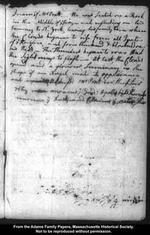
Dream of Mr. Pratt. He was seated on a Rock, in the Middle of the Sea, and reflecting on his journey to N. York, leaving his family &c., when the Clouds began to rise from all Quarters of the Horison, and soon thickened and blackened over his Head. The Thunders began to roar And the Lightnings to flash. At last, the Clouds opened and a glorious Luminary, in the shape of an Angel, made its Appearance and [illegible] addressed Mr. Prat in these Lines
Why [illegible] mourns the Bard? Apollo bids thee rise,
renounce the Dust, and Claim [thy] native skies.
Page 32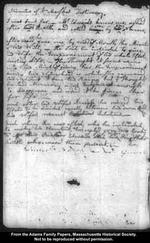
Minutes of Dr. Marshes Testimony.
I was sent for. Mr. Edwards knew me, asked after his my Health, and called him me by his my Name.
Afterward he gave me, by Word of Mouth the Minute of his Will. He said he intended to give his Wife, the Improvement of his whole Estate during Life. The Thought it seems came into his Mind of giving her the Improvement during her Widowhood, or while she remained his Widow and bore his Name, but that Thought he had Memory and judgment enough to disapprove, and ordered it be given her for Life.
And after his Wifes Decease, he ordered his Estate to be divided equally between his own and his Wifes nearest Relatives Relatives.
And when he was asked, who he intended to make his Executors, he replyed you two, looking to his Brother Edwards and his Wifes Brother Smith who were then present.
Page 33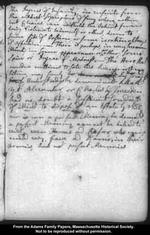
The Degrees of Insanity, are infinite from the wildest symptoms of fury, when nothing but Chains can withold the Patient from doing Violence to himself or others, down to some fits of Passion, or some irrational Pangs of Affection. There is perhaps, in every human Mind, in some appearance or another, some Spice or Degree of Madness. The Hero that murders millions to sate his Revenge or Ambition, may surely [illegible] by the soundest Understanding be denominated a Madman. Yet Alexander, or Charles of Sweeden had no doubt, a sufficient soundness of Mind to dispose of an Estate by Will. Nor can a perfect Memory be demanded. A perfect Memory cannot be believed to exist. Even Xerxes and C sar, who remembered every face and Name in their Armies, had not perfect Memories.
Page 34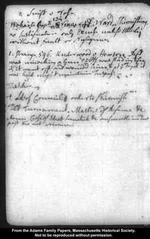
Swift v. Vose.
Hobarts Reports, 134.. Weaver* and Ward. Skirmishing. No Justification only Excuse, unless Utterly without fault or Negligence.
1. Strange, 596. Underwood v. Hewson. Defendant was uncocking a Gun, and the Plaintiff was standing to see it, it went off and wounded him, and at the Tryal it was held might maintain Trespass.
Thatcher.
* Lords of Council's order to skirmish.
Tilt Turnament. Masters of Defence &c.
Mem. Case of Ideot, Lunatick &c. answerable in Trespass tho not criminal.
Page 35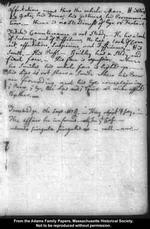
Affectation runs thro the whole Man. His Air, his Gate, his Tone, his Gestures, his Pronunciation. There is no Steadiness of Eye or Feature.
Fitch's Countenance is not Steady. He has a look of jealousy, and of Diffidence. He has a look of Conceit, affectation, Suspicion, and Diffidence. His swell. His Puff. Gridley has a stedy and fixed face. His face is expressive. When he smiles, his whole face is lighted up. His Lips do not shew a smile when his Brows are frounding, and his Eye complaining. The Brow, the Eye, the Lips and the Voice all alike affected together.
Trowbridge. Oh says Mr. G. They object and say a . The officer he informs-- why In that Case-redendo singula singulis. -- Well -now
Page 36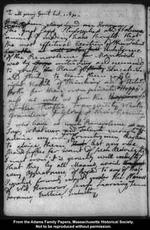
[Fragmentary draft of an essay intended for publication; no printing has been found.] To all young gent.gentlemen between [20 and 30 ?]
[illegible] Many of the great sages, Phylosophers and statesmen, ancient and modern, have thought that the most effectual Exertion of their Talent [illegible] Indulgence of the Benevolence for Mankind was by [illegible] contriving and recommending to youth, Plans of Study Education and study, to train them early to right Habits of Thinking and of Acting, both for their own private Happiness as well as for the Happiness of the Public Tranquility, Wealth, Grandeur and Glory of their Country. I who have as much Benevolence, as any Sage, whatever, and Talents enough to advize my own young Countrymen, beg leave to advize them, that (lest any one should suffer for want of such Advice tho I must own it is generally well understood that they by all Means, avoid [illegible] every Appearance of Regard to any of those Properties, formerly respected under the Name of Wit, Humour, sense, Learning, Temperance, Justice, Industry,
Page 37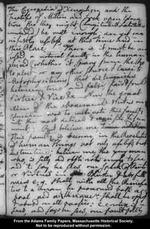
The Cyropedia of Xenophon, and the Treatises of Milton and Lock upon Education, tho they might, (Longitude and Latitude considered) be well enough, are yet manifestly useless, at this Time and in this Place. There is it must be confessed, a natural faculty in the human mind (whether it sprang from the Protoplast or any other source I leave to Metaphysitians), that distinguishes between true and false, fair and foul, Virtue and Vice &c. -- Now the great Aim of the abovementioned Writers on Education was to cultivate this faculty into the most delicate and exquisite Discernment: But believe me, Time and Place This faculty is become in the Revolution of human Things not only useless, but destructive: believe me, the young man who is silly and obstinate enough to see and to say he sees, one spark of Parts or Virtues in Bluster and his followers e.g. shall with all the Benefactors to a man, be pronounced both a fool and a Knave: shall be opposed and abused on all occasions: e. contra if he sees, and says he sees, one fault, folly,
Page 38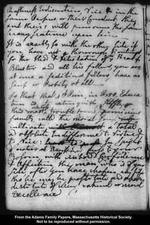
Rashness, Indiscretion, Vice &c. in the same Persons or their Conduct, they and theirs will pronounce the same heavy sentence upon him. It is exactly so with the other side--if you have not a thourough Contempt for the Head and Detestation of the Heart of Bluster and all his followers, you are at once a seditious fellow, have no sense or Probity at all.
So that the ist Principle in Prov [Provincial] Education is to extinguish, stiffle, this most useless, troublesome, pernicious faculty, called the moral sense, [and] cultivate [illegible] a total and absolute Indifference to Virtue and to Vice: [illegible] In spight of natural Aversions press to your Bosom, with unbounded Confidence and Affection, the man who is of your side, after you have chosen any side, tho he may be prostitute and abandoned, destitute of every natural or moral Excellence.
Page 39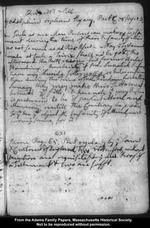
Edwards's Will.
Godolphins orphans Legacy. Part i. C. 8. Page 23.
2. Such as are Mad Persons can make no Testament during the time of their Insanity of Mind, no not so much as ad Pios Usus. Nay the Testament made at such a Time shall not be good, tho afterward the Party recover his former Understanding; howbeit, if such Lunatick Persons have any Lucida Intervalla, or Intermissions then during the Time of such Freedom from the Lunacy they may make their Testaments betwixt the fitts. And here note, that every Person is presumed to be of perfect Mind and Memory, untill the Contrary be proved. So that he that objecteth Insanity of Mind, must prove the same, for which [quotation breaks off thus in MS]
C. 21.
Same Page 65. But regularly by the Laws and Customs of England, two Witnesses, without Exception, are requisite for the due Proof of a Testament and two are sufficient.
Page 40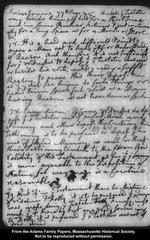
Swinbourne 77th. Page 78. Unless the Testator were besides himself but for a short Time and in some Peculiar Actions and not continually for a long space as for a Month or More, &c.
78. It is a hard and difficult Point to prove a Man not to have the Use or Understanding of Reason. And therefore, it is not sufficient for the Witnesses to depose that the Testator was mad or besides his Wits: unless they render a sufficient Reason to prove this their Deposition as that they did see him do such Things or heard him speak such Words as a Man having Reason would not have done or spoken.
78. lower down. If some Witnesses do depose that the Testator was of perfect Mind and Memory and others depose the Contrary, their Testimony is to be preferred which depose that he was of sound Memory, as well for that their Testimony tendeth to the favour And Validity of the Testament, as for that the same is more agreable to the Disposition of Nature, for every man is a Creature reasonable.
79. But if in the Testament there be Mixture of Wisdom and Folly it is to be presumed that the same was made during the Testators Frensy, insomuch that if there be but one Word sounding to Folly, it is presumed that the Testator was not of sound Mind.
Page 41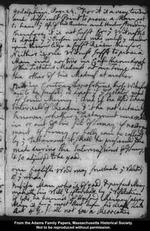
Godolphin. Page 24. For it is a very tender and difficult Point to prove a Man not to have the Use of his Reason and Understanding; therefore it is not sufficient for the Witnesses to depose that the Person was mad, unless they render upon Knowledge a sufficient Reason therefor. Neither is one Witness sufficient to prove a Man mad, nor two in Case the one depose of the Testators Madness at one Time and the other of his Madness at another.
But in Contrary Depositions, those Witnesses are to be preferred, which depose that the Testator was of sound Memory: And if he Used to have Intervals of Reason and it be not certainly known, whether the Testament were made in or out of his fits of Lunacy; if no Argument of frenzy or folly can be collected by the Testament, it shall be presumed to be made during the Intermissions of the Lunacy, and so adjudged to be good.
One foolish Word may frustrate the Validity of the whole.
But if a Man who is of good and perfect Memory maketh his Will, and afterwards by the Visitation of God, he becomes of Unsound
Memory (as every Man is for the most Part, before his death) this Act of God shall not be a Revocation.
Page 42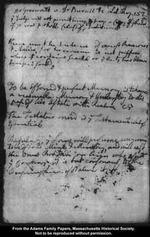
Dr. Groenvelt v. Dr. Burrell &c. Ld. Ray. [Raymond ] 252.
The judge will not permit him to have a Copy of the Record if there was probable Cause of the Indictment.
There must be Evidence of express Rancour and Malice, for Innocence is not sufficient where it contains scandal or the Party has been imprisoned.
To be of sound and perfect Memory, is to have a reasonable Memory and Understanding to dispose of his Estate with Reason. 25.
The Testators mind is the Testaments chief Essential.
Regularly, the Law will presume every man to be of sound Mind and Memory, and will cast the Onus Probandi on him who asserts the Contrary; which is but consonant to the Presumption of Nature itself.
Inside Back Cover
Back Cover
[Blank page -- no image available]











































